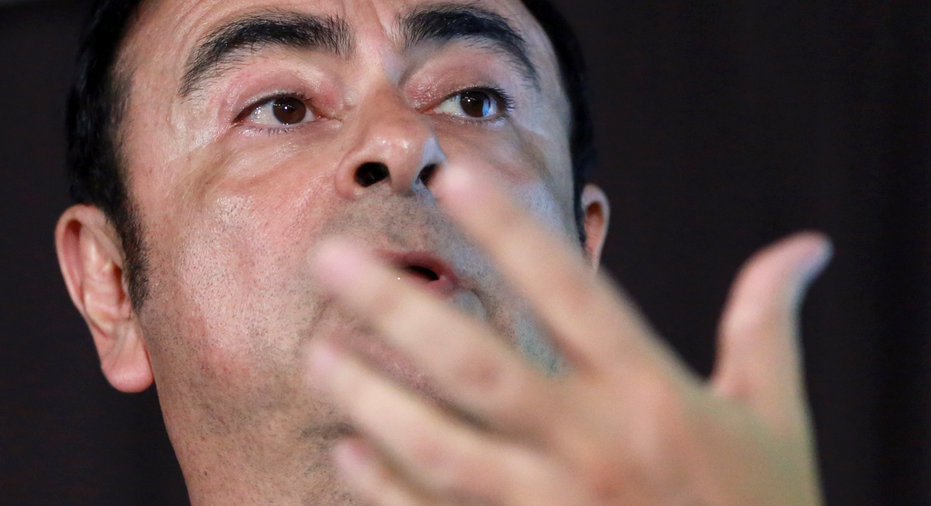Nissan chairman arrested in probe of financial misconduct
FILE - In this May 12, 2016, file photo, head of Nissan Motor Co. Carlos Ghosn answers a question during their joint press conference in Yokohama, near Tokyo. Japanese media say Ghosn, Nissan Motor Co. chairman, is being questioned by Tokyo prosecutors on suspicion he falsified his financial reports. Nissan said Monday it was looking into the reports, while prosecutors declined comment.(AP Photo/Eugene Hoshiko, File)
YOKOHAMA, Japan – Nissan Chairman Carlos Ghosn, who became one of the auto industry's most powerful executives by engineering a turnaround at the Japanese manufacturer, was arrested Monday and will be fired for allegedly underreporting his income and misusing company funds, the automaker said.
The scandal reverberated across the globe and abruptly threw into question Ghosn's future as leader of the Renault-Nissan-Mitsubishi alliance, which sold 10.6 million cars last year, more than any other manufacturer.
Nissan CEO Hiroto Saikawa said Ghosn was taken into custody after being questioned by prosecutors upon arriving in Japan earlier in the day. Ghosn is of French, Brazilian and Lebanese background and lives in both France and Japan.
Nissan said Ghosn, 64, and another senior executive, Greg Kelly, were accused of offenses involving millions of dollars that were discovered during a monthslong investigation set off by a whistleblower. Kelly was also arrested.
"Beyond being sorry I feel great disappointment, frustration, despair, indignation and resentment," Saikawa said, apologizing for a full seven minutes at the outset of a news conference.
Yokohama-based Nissan Motor said it is cooperating with prosecutors in their investigation.
Saikawa said Nissan's board will vote Thursday on dismissing Ghosn and Kelly, whom he described as the mastermind of the alleged abuses.
"This is an act that cannot be tolerated by the company," he said. "This is serious misconduct."
Saikawa said three major types of misconduct were found: underreporting income to financial authorities, using investment funds for personal gain and illicit use of company expenses.
He said that because of the continuing investigation, he could not disclose many details. But he promised to tighten internal controls, saying the problems may have happened because too much power was concentrated in one person.
"We need to really look back at what happened, take it seriously and take fundamental countermeasures," he said.
Ghosn officially still leads the Renault-Nissan-Mitsubishi alliance as CEO and chairman. But experts said it is unlikely he will be able to stay on there or at Renault, where he is also CEO. Renault said its board will hold an emergency meeting soon.
"The last thing one of the world's biggest automakers needs is the disruption caused by an investigation into the behavior of a man who has towered over the global auto sector," said Michael Hewson, chief market analyst at CMC Markets in London.
The companies in the alliance own parts of each other and share investments in new technologies, among other things. Renault owns 43 percent of Nissan, which owns 15 percent of Renault and 34 percent of Mitsubishi.
Renault SA stock plunged more than 8 percent in France. Japanese markets had already closed when the scandal broke.
Ghosn was at Nissan for 19 years and signed a contract this year that would have run through 2022. His compensation, high by Japanese standards, has been a source of controversy over the years.
According to NHK and the Kyodo News Service, Nissan paid Ghosn nearly 10 billion yen ($89 million) over five years through March 2015, including salary and other income, but he reported receiving only about half that amount.
The allegations are a serious blow at a time when Nissan is still getting over a scandal in which it admitted altering the results of emission and fuel economy tests on vehicles sold in Japan.
Ghosn is credited with helping bring about a remarkable turnaround at Nissan, resuscitating it from near bankruptcy by cutting thousands of jobs and shutting plants. His triumph made him something of a national hero in a country where foreign CEOs of major Japanese companies are relatively rare.
He also looms large in France, where he previously turned Renault around and made it into a global player, notably in electric vehicles. He led the French carmaker through major job cuts and an expensive and contentious bailout, earning the nickname "Le Cost Cutter."
Ghosn became a nemesis of French unions and left-wing politicians, who saw him as a symbol of capitalism's excesses, particularly its rich executive pay packages.
Renault shareholders in 2016 voted against Ghosn's pay package as too generous, but the board ignored the move.
That angered then-President Francois Hollande. Hollande's socialist government imposed limits on executive pay at state-run companies and tried to do the same in the private sector but backed down amid concerns such action would scare away foreign investment.
Ghosn served as Nissan's chief executive from 2001 until last April. He became chief executive of Renault in 2005, leading the two major automakers simultaneously. In 2016, he became Mitsubishi Motors' chairman.
Saikawa said the scandal was a "negative outcome of the long regime of Mr. Ghosn."
___
Mari Yamaguchi in Tokyo and Angela Charlton in Paris contributed to this report.
___
Yuri Kageyama is on Twitter at https://twitter.com/yurikageyama
On Instagram at https://www.instagram.com/yurikageyama/?hl=en





















